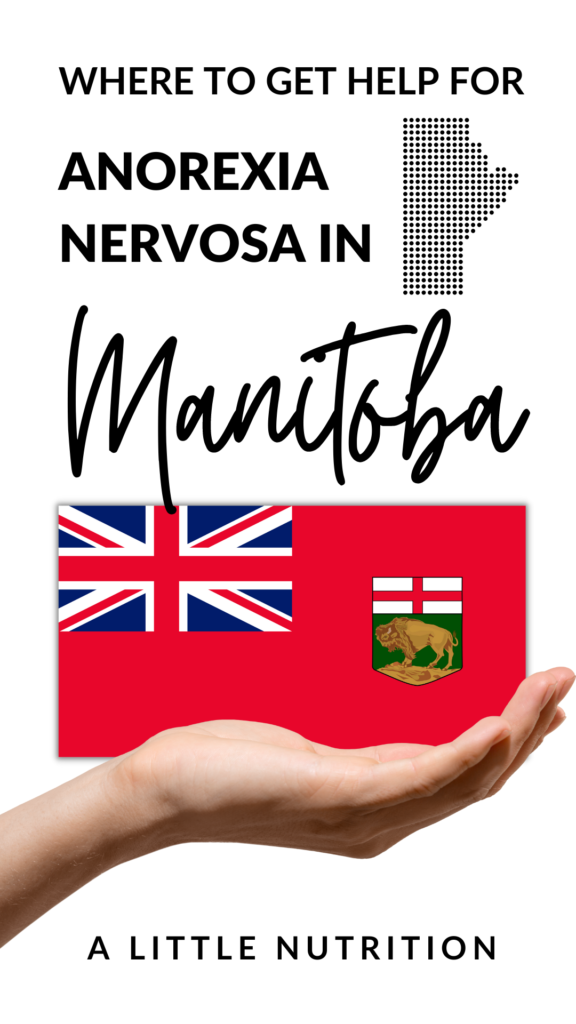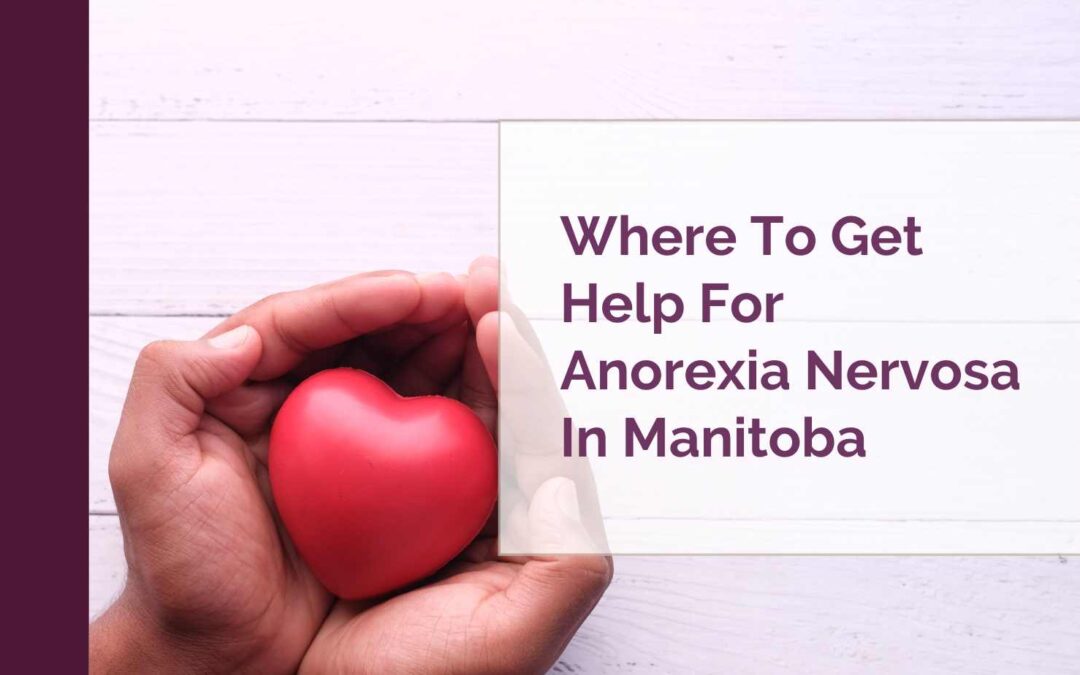Are you looking for resources for anorexia nervosa in Manitoba? Manitoba has several resources available to help you or your loved one on their path to recovery. Anorexia nervosa is a complex and severe mental health condition. And it can have long-term physical and emotional consequences if left untreated. Seeking help from healthcare professionals, mental health services, and support groups can provide the guidance and support necessary to address the underlying psychological issues. As well as develop a healthier relationship with food and your body. This article will review information about anorexia nervosa and eating disorder resources available in Manitoba.
Understanding Anorexia Nervosa
Anorexia nervosa involves the persistent restriction of food intake and can lead to severe malnutrition. Individuals with anorexia nervosa can have an intense fear of gaining weight. They may (but not always) present with low body weight relative to age, sex, developmental progression, and physical health. As well as individuals may have a misrepresented perception of their body shape and size.
Atypical anorexia is another type of anorexia. Atypical anorexia is diagnosed when an individual has anorexia but lives in a body that is not considered underweight. The medical and psychological impact is the same for anorexia nervosa and atypical anorexia.
A note on the medical term “Atypical anorexia nervosa”
At our practice, we refrain from using the term Atypical anorexia nervosa due to the potential harm it can cause by minimizing one’s experience and falsely implying that their condition is less severe than those who are not diagnosed as “atypical.” Instead, we recognize the seriousness of all eating disorders and believe that everyone deserves compassionate care, regardless of their diagnosis. With this in mind, it’s important to consider several aspects when discussing the term “atypical anorexia nervosa.”
- Healthcare professionals or loved ones may minimize the severity of an individual’s anorexia due to its “atypical” presentation.
- This can lead those suffering from atypical symptoms of the disorder to delay seeking help.
- Certain behaviors or symptoms, such as weight loss and restriction of food intake, which do not fit the typical image of someone with anorexia may be dismissed.
- The use of the term “atypical” can contribute to stigma and misunderstanding of the disorder, as well as misdiagnosis and delayed treatment.
Common Signs and Symptoms of Anorexia Nervosa
- Changes in weight lead to weight loss, but not in all cases
- Intense fear of gaining weight
- Distorted body image and self-perception
- Rigidity with meals, food, and eating
- Preoccupation with food, calories, weight, fat grams, and dieting
- Obsessive or compulsive behaviors related to food or exercise
- Avoiding or restricting certain types of foods or food groups
- Denial of hunger, even when no food has been eaten
- Drinking a high volume of water or non-calorie beverages
- Persistent avoidance of situations that involve food, particularly during mealtimes
- Significant emotional changes, such as increased irritability, hostility, suspicion, intolerance, and secretive behavior
- Food rituals include extended chewing, consuming food in specific sequences, or rearranging items on a plate
- Wearing oversized clothing to hide thinness
- Moodswings
- Engaging in excessive exercise or physical activity
- Frequently weighing oneself or checking one’s body in the mirror
- Social isolation and withdrawal from usual friends and activities
The National Institute of Mental Health reports that individuals living with anorexia may exhibit the following physical consequences:
- Very low blood pressure and an abnormally slow heart rate due to changes in the heart muscle
- Feeling cold all the time, finding it hard to stay warm. A drop in internal body temperature causes a persistent feeling of coldness and lethargy.
- Dry skin
- Gastrointestinal problems, like gas, bloating, and constipation
- Loss of menstrual period
- Men living with anorexia may experience hormonal changes that are different from those seen in women with the disorder. For example, men may experience a decrease in testosterone levels, which can lead to decreased muscle mass, sexual dysfunction, and fatigue.
- Dry and brittle bones
- Muscle weakness and loss
- Severe dehydration leading to kidney failure
- Weakness, fainting, and fatigue
- Hair loss with dry hair and skin
- The growth of lanugo, a downy layer of hair all over the body and face in an attempt to preserve body heat
- Dry and yellowish skin
Anorexia nervosa carries a high risk of fatality compared to other mental disorders. The illness can lead to medical complications associated with starvation, which may result in death. Moreover, individuals with anorexia have a high risk of committing suicide, which is the second leading cause of death among them. Anorexia is the third most prevalent chronic illness among adolescents. Its mortality rate is twelve times higher than all causes of death for females aged fifteen to twenty-four.
Where to get help for Anorexia Nervosa in Manitoba
Get a Physical Check-Up
If you suspect you, your child, or someone you know has anorexia in Manitoba, it’s essential to visit your family doctor or primary care provider for a physical health check-up. A physical check-up is important for a comprehensive evaluation of the individual’s physical health. And can help identify any medical complications or risks associated with the disorder.
During a physical check-up, a healthcare provider can assess the individual’s weight, height, vital signs, and overall physical health. Blood tests may be conducted to check for nutritional deficiencies and electrolyte imbalances. The provider may also perform a physical exam to check for signs of malnutrition, such as dry skin, brittle hair and nails, and abdominal swelling.
In addition to a physical exam, a healthcare provider may conduct a mental health assessment to evaluate the individual’s emotional well-being and any underlying psychological factors contributing to anorexia nervosa. A mental health assessment can help to determine the appropriate treatment plan and referrals to specialized eating disorder treatment programs.
A note on Weight checks
If you are struggling with an eating disorder or helping someone who is, going to the doctor’s office for a routine checkup or medical evaluation can be a difficult and anxiety-inducing experience. One common source of anxiety for individuals with eating disorders is being weighed at the doctor’s office, as this can trigger feelings of shame, guilt, and fear related to food and body image. However, requesting a “blind weight” at the doctor’s office can help to reduce this anxiety and make the experience more manageable.
A blind weight is a term used to describe a type of weight measurement that is taken by a healthcare provider but is not immediately disclosed to the patient. Instead, the patient is allowed to turn away from the scale or is given a gown or other covering to wear during the measurement, so that they do not have to see the number on the scale. This can be a helpful tool for individuals with eating disorders, as it can help to reduce anxiety and stress related to weight and body image.
Reach Out for Support
Reaching out to family and friends for support when dealing with anorexia nervosa can be an essential step in recovery. Eating disorders, such as anorexia nervosa, can be very isolating. Having a support system can provide encouragement and motivation to seek treatment. Or connect with several online and in-person local services that help with the recovery of anorexia in Manitoba.
Here are some tips for reaching out for support:
Be honest
- Let your loved ones know you are struggling with an eating disorder and need their help and support. By being open and candid about our hardships, we can break down obstacles and foster understanding.
Educate your loved ones
- Many people may not fully understand what anorexia nervosa is or how it affects individuals. Educating your loved ones on the disorder and its symptoms can help them better understand what you are going through and how to best support you.
Be specific about what you need
- Let your loved ones know what kind of support you need. Support could be anything from someone to talk to when you feel down to someone to go with you to treatment appointments.
Set boundaries
- It is crucial to set boundaries with your loved ones and communicate what is and is not helpful to you. Boundaries can help to prevent unintentional harm. And ensure that your support system is genuinely helping you.
Consider joining a support group.
- There are many support groups for individuals with eating disorders. Joining a support group can provide a sense of community. Plus, provide you with support from others who have experienced similar struggles.
Remember, recovery from anorexia nervosa is possible. Having a solid support system can make a significant difference in the recovery journey.
Self-Help Books
Self-help books can be helpful for individuals with anorexia nervosa who are seeking to recover. Here are a few options:
8 Keys to Recovery from an Eating Disorder: Effective Strategies from Therapeutic Practice and Personal Experience” by Carolyn Costin
- This book offers practical advice for individuals recovering from an eating disorder. This book provides strategies for addressing body image, relationships, and emotions. Plus, tools for building a solid support system.
The Body Is Not an Apology: The Power of Radical Self-Love” by Sonya Renee Taylor
- This book offers a powerful message of self-acceptance and self-love. Focusing on rejecting society’s unrealistic beauty standards.
Life Without Ed” by Jenni Schaefer
- This book is a memoir/self-help hybrid that offers a personal account of Schaefer’s struggles with anorexia and her journey toward recovery. The book includes practical strategies for overcoming eating disorder behaviors, as well as exercises and prompts to help readers explore their own experiences with the disorder.
Goodbye Ed, Hello Me” by Jenni Schaefer
This book is a follow-up to Schaefer’s “Life Without Ed” and focuses specifically on the recovery process. It includes personal anecdotes and reflections from Schaefer and others who have recovered from anorexia, as well as exercises and tools to help readers cultivate a more positive relationship with food and their bodies.
Eating in the Light of the Moon” by Anita Johnston
This book takes a more holistic approach to eating disorder recovery, focusing on the connections between food, emotions, and spirituality. It includes exercises and tools for cultivating a healthier relationship with food and body image, as well as personal anecdotes and stories to help readers feel less alone in their struggles.
Remember, self-help books can be a helpful supplement to professional treatment for anorexia nervosa. But should not be used as a substitute for medical or mental health care.
Connect with Local Services in Manitoba
Connect with local services that help with the recovery of anorexia in Manitoba.
- Book an appointment at A Little Nutrition with the team of Registered Dietitians and Therapists who help adolescents and adults recover from disordered eating and eating disorders through in-person and virtual appointments. Book a free consult with Susan Watson, RD the owner to see if our team would be a good fit for you or your loved one >>> https://alittlenutrition.janeapp.com/#/discipline/2/treatment/53
- Join the free virtual Eating Disorders Caregivers Support Group at A Little Nutrition if your child struggles with an eating disorder.
- Book an appointment at the Women’s Health Clinic
- Contact a helpline: For support and resources, contact the NEDIC helpline at 1-866-NEDIC-20 and live chat services are available: 8 am – 8 pm Monday – Thursday, 8 am – 4 pm on Friday, 11 – 4 pm on Saturday and Sunday.
- Join the Mood Disorders Association of Manitoba Disordered Eating and Body Image Support Group
Remember, getting help is important. There are several resources available to support you in your recovery journey from anorexia in Manitoba. Don’t be afraid to ask for assistance and guidance.
Pin Me For Later







